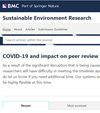Renewable energy, agriculture, and carbon dioxide emissions nexus: implications for sustainable development in sub-Saharan African countries
IF 4.8
3区 环境科学与生态学
Q2 ENGINEERING, ENVIRONMENTAL
引用次数: 0
Abstract
Abstract Sub-Saharan Africa (SSA) has experienced a high economic growth rate over the last two decades, which has been accompanied by concerns about increasing carbon dioxide (CO 2 ) emissions. This study aims to find out whether renewable energy and agriculture can help reduce CO 2 emissions for selected SSA countries. A balanced dataset incorporating CO 2 emissions, renewable energy consumption, agricultural land per capita, GDP per capita, urbanization level and energy intensity of 38 SSA countries covering the period 2000–2019 is utilized. The differentiated-generalized method of moments (GMM) is employed as a benchmark estimation method to estimate the effects of renewable energy and agriculture on CO 2 . The regional heterogeneity analysis of countries at different income levels is then carried out. The moderating role of government governance in the energy-agriculture-environment nexus is also investigated. The following conclusions are highlighted: (1) the consumption of renewable energy can reduce CO 2 emissions, while agriculture increases them; (2) the mitigating effect of renewable energy on CO 2 emissions is relatively larger in countries at a low income level countries than in high-income countries, while agriculture aggravates CO 2 emissions in lower middle-income and low-income regions, but mitigates emissions in upper middle-income regions; and (3) governance quality turns the mitigating role of renewable energy use on CO 2 emissions into an increasing one, and exaggerates the polluting effect of agriculture. Finally, the study proposes policy implications for improving renewable energy use and green agricultural growth to achieve sustainable development in SSA.可再生能源、农业和二氧化碳排放关系:对撒哈拉以南非洲国家可持续发展的影响
撒哈拉以南非洲地区(SSA)在过去20年经历了高速经济增长,但同时也伴随着对二氧化碳(co2)排放增加的担忧。本研究旨在找出可再生能源和农业是否可以帮助选定的SSA国家减少CO 2排放。利用2000-2019年38个SSA国家二氧化碳排放、可再生能源消费、人均农业用地、人均GDP、城市化水平和能源强度的平衡数据集。采用微分广义矩量法(GMM)作为基准估计方法,估计可再生能源和农业对co2的影响。然后对不同收入水平的国家进行区域异质性分析。本文还探讨了政府治理在能源-农业-环境关系中的调节作用。研究结果表明:(1)可再生能源消费可以减少二氧化碳排放,而农业则会增加二氧化碳排放;(2)可再生能源对co2排放的缓解作用在低收入国家要大于高收入国家,而农业在中低收入和中低收入地区加剧了co2排放,但在中高收入地区缓解了co2排放;③治理质量将可再生能源利用对co2排放的抑制作用转化为增加作用,并夸大了农业的污染效应。最后,提出了提高可再生能源利用和绿色农业增长以实现可持续发展的政策建议。
本文章由计算机程序翻译,如有差异,请以英文原文为准。
求助全文
约1分钟内获得全文
求助全文
来源期刊

Sustainable Environment Research
Multiple-
CiteScore
8.00
自引率
2.00%
发文量
47
审稿时长
30 weeks
期刊介绍:
The primary goal of Sustainable Environment Research (SER) is to publish high quality research articles associated with sustainable environmental science and technology and to contribute to improving environmental practice. The scope of SER includes issues of environmental science, technology, management and related fields, especially in response to sustainable water, energy and other natural resources. Potential topics include, but are not limited to: 1. Water and Wastewater • Biological processes • Physical and chemical processes • Watershed management • Advanced and innovative treatment 2. Soil and Groundwater Pollution • Contaminant fate and transport processes • Contaminant site investigation technology • Soil and groundwater remediation technology • Risk assessment in contaminant sites 3. Air Pollution and Climate Change • Ambient air quality management • Greenhouse gases control • Gaseous and particulate pollution control • Indoor air quality management and control 4. Waste Management • Waste reduction and minimization • Recourse recovery and conservation • Solid waste treatment technology and disposal 5. Energy and Resources • Sustainable energy • Local, regional and global sustainability • Environmental management system • Life-cycle assessment • Environmental policy instruments
 求助内容:
求助内容: 应助结果提醒方式:
应助结果提醒方式:


